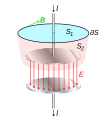File:Displacement current in capacitor.svg
Appearance

Size of this PNG preview of this SVG file: 558 × 600 pixels. Other resolutions: 223 × 240 pixels | 446 × 480 pixels | 714 × 768 pixels | 952 × 1,024 pixels | 1,905 × 2,048 pixels | 744 × 800 pixels.
Original file (SVG file, nominally 744 × 800 pixels, file size: 57 KB)
File history
Click on a date/time to view the file as it appeared at that time.
| Date/Time | Thumbnail | Dimensions | User | Comment | |
|---|---|---|---|---|---|
| current | 14:28, 20 November 2008 |  | 744 × 800 (57 KB) | Chetvorno | == Summary == {{Information |Description={{en|Diagram of a widely used example demonstrating need for the displacement current term in Maxwell's equations.}} The diagram shows a [[Wikip |
| 04:56, 11 November 2008 |  | 744 × 800 (58 KB) | Chetvorno | {{Information |Description=Diagram demonstrating need for displacement current term in Ampere's Law. |Source=Own work by uploader |Date=2008-11-10 |Author=Chetvorno |Permission=I Chris Burks (Chetvorno) the author rel |
File usage
The following 2 pages use this file:
Global file usage
The following other wikis use this file:
- Usage on ba.wikipedia.org
- Usage on ce.wikipedia.org
- Usage on de.wikipedia.org
- Usage on de.wikibooks.org
- Usage on en.wikiversity.org
- Usage on es.wikipedia.org
- Usage on fi.wikipedia.org
- Usage on he.wikipedia.org
- Usage on hy.wikipedia.org
- Usage on no.wikipedia.org
- Usage on ro.wikipedia.org
- Usage on ru.wikipedia.org
- Usage on tr.wikipedia.org










